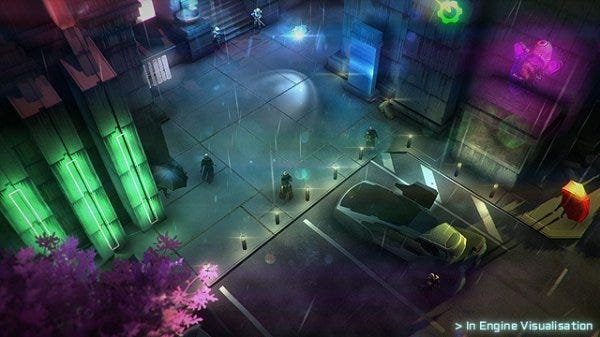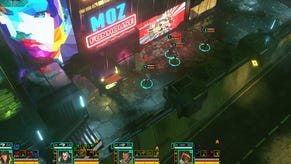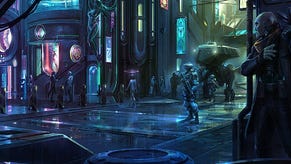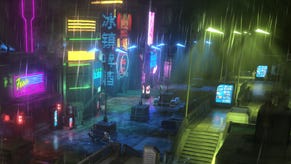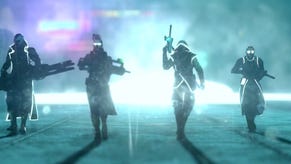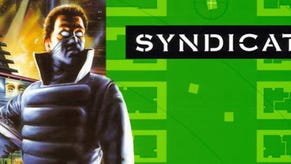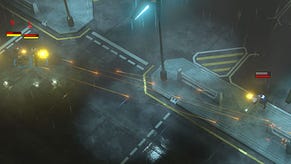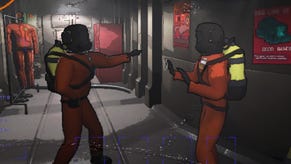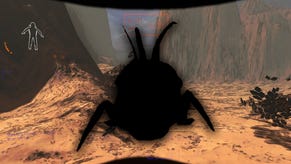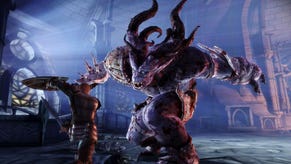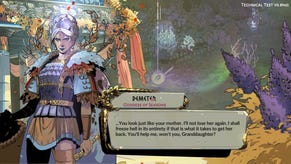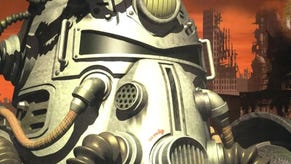Satellite Reign And Syndicate's Simulation Legacy
Mike Diskett Interview
Perhaps it's my insomnia, but I'm feeling rather emotional. There was something that made me want to well up in my interview with Satellite Reign lead, Mike Diskett. Even with the fall of Mucky Foot on his CV, it seems unfair to say that Diskett has had a tough time of it – he's a talented programmer working on numerous successful (and not so successful) projects over many years – now living in Brisbane. But there's something else simultaneously tragic and beautiful going on here, which is bound up with the two empty decades since Syndicate Wars. It's something about the dreams of what games could be. Diskett believes and lives that simulation dream. He is one of the pioneers at the heart of the idea of open worlds and living systems.
“Behaviour,” he told me, “not scripting.” I could have wept.
Satellite Reign is a new open world cyberpunk city RTS from the lead progammer of Syndicate Wars, yes, but it also another chance for man who has been embittered by the worst aspects of our industry's commercial ferocity. In picking up a gauntlet forged in the 1990s, he found the grit to fight back. Help him. Do it now.
Then read on for the rest of what he had to say, and the reason why I have become a believer.
RPS: Last year when the Kickstarter stuff was starting to really heat up, I said to Gillen that we should go and find Mike Diskett and tell him to do a Syndicate-like Kickstarter. With so many American classics getting spiritual successors, it seems like a time to bring back some of those visions from the Amiga days that really made us who we are. But it turns out we didn't have to go on that peculiar quest, because you were already on that same path?
Diskett: When Kickstarter really started being successful, I suppose about eighteen months ago, I began thinking about whether there would be any interest in a game that followed Syndicate and Syndicate Wars, and I wasn't totally sure that there would be enough interest out there. Especially given that the original Syndicate games didn't sell well. Despite that, I suppose, everyone I meet has played them. At least in the games industry. They're well-known games, even if they were not commercially great. I've moved around between a lot of different companies, across England, Scotland, Australia; Rockstar, THQ, Pandemic – most places I went I expected people to ask about working on GTA at Rockstar North, but actually they asked about Syndicate Wars. It was that project that interested people, not GTA!
RPS: But isn't that people of a certain age? Gillen and myself are getting on a bit now, and that's why we are old men playing at running the world constantly banging on Amiga stuff, and isn't that true of a maturing game development community?
Diskett: It's odd because the people I work with are often quite young, and I've met fans of Syndicate who were barely born when the original game came out. These are people who have played the game and won't even know what an Amiga was. They've played it on the PC when they were young, maybe they didn't have a good PC, but had one that could play some old Bullfrog classics, something like that. The point is: there are all these 20-somethings that remember it, because of being able to play older games on the PC. So I knew there was some audience there. But there was another thing that really brought home what a fanbase there was for this sort of game, which was... well, I really like Starcraft II. I used to play constantly and I used to watch the Day9 'casts. He does all these videos, and he did a “lifetime in Stacraft” video, which I watched, and one of the things he said was about how he used to play Syndicate Wars with his brother. So there was this moment where I thought: One of my heroes played and loved this old game I worked on! So that was a revelation.

RPS: And makes you realise how incredible the reach of a single game can be...
Diskett: Of course these days there's no kind of city sci-fi RTS type games at all. There are a lot of collect-resources and WW2 type RTS games, but there's nothing that is a city simulation. There are also only a few games which focus on a small team. You seem to get a lot of games where there are hundreds of individual units, or stuff like League Of Legends where you're microing one unit and really focused on that. But there's nothing where you have this strange handful of units, four agents which you can use independently. There's been nothing remotely like it for twenty years. Twenty years in which the people who loved this kind of play had nothing!
RPS: At what point did you throw your arms up and say “Doing it!”?
Diskett: Well, it's been like that for years, for me. But how do you fund it? Do you have enough savings to live for a year, or more, while you work? We have a team of five here to do this and so do they all have enough savings to live and work for a year? It's very hard to do. Without Kickstarter, this would not be possible. You can go to publishers and try and sell them on the idea, but it's a nightmare. When I owned Mucky Foot Productions we went through that process time and time again, trying to sell original games to publishers. You couldn't even really begin to talk to them about Syndicate-like games without owning the IP. It was just the end of the conversation, right there. I don't really want to head back to that business model, ever, really. The problem that people do not talk about is that publishers pay you on a monthly basis, based on milestones that you have to deliver and present to them. In the end you spend as much time jumping through their hoops as you do working on a game.
RPS: So your years of bitter experience in that regard will feed back not just into development, but making the most of a Kickstarter-modelled funding?
Diskett: Definitely. It's made me realise that I don't want to get big, ever again. At Mucky Foot we started with about five and got up to thirty-eight at our max. This time I want to remain independent for finance, and stay tiny. I don't want to have to please publishers, I just want to make the game I am working on.
RPS: I've been having a lot of related conversations actually. There was a chap telling me on Twitter last night that any funding of indies would have to be “managed” if they were to make money, but then I look at the army of indies who are experienced veterans, capable business people, and where indie means “not funded or owned by a third-party” and also “small team” and I realise that's not true. In your case, you've learned all the lessons over several decades, and have a team of veterans to help you?
Diskett: I suppose it's kind of a double-edged sword. I am jaded and cynical, now. There's a certain aspect of being optimistic about your relationship with a publisher that might see some people through and allow them to be victorious at the end... I like to think that my experience at Mucky Foot will smooth the road for us, though. We went in blind at that time, we had no idea how much work we were taking on with running the business and managing the studio, hiring cleaners and lawyers. I've been through all that, so I know what it all means, which I suppose some people who say “I'm going to make videogames!” will not.
RPS: I think it's clear that people were much quicker to attack Syndicate Wars than they were Syndicate. When the Satellite Reign Kickstarter appeared a fair number of people were eager to voice their dislike over Wars vs Syndicate. Is that fair? I liked Wars less, but played it more, due to the PC I had at University – oh I am one of those guys you were talking about!
Diskett: One of the problems with Syndicate Wars was that we rushed into making it 3D. The hardware wasn't really ready for it. When the first Syndicate came out it was one of the first games to appear in 640x480 hi res. It was all sprite and tile based, and looked good as a result. When we went to 3D for Syndicate Wars that was actually a step back, because although it was 3D and lit and you could rotate the world, it was low-res, 320x240. And yeah. And it had niggly design issues in there that I now regret not changing. One of those, which I think was critical, was that how zoomed out you were was based on the gun you had selected. Since you started with Uzi you were zoomed in quite close at the beginning. Even the minigun was only mid-level zoom. So it wasn't until later in the game that you could zoom out and get a sense of the city that you got immediately in the first game. All that said, we had a lot of time to work on the level design tools, and the levels in Syndicate Wars are much better, with much more going on than in the original game. Unfortunately you ended up fighting with the interface because had to rotate the map occasionally, and that meant it was a confusing thing rather than a feature. It was just there because it was 3D.
RPS: And that's reflected in your design for Satellite Reign?
Diskett: Even though we're completely rendered in 3D, we're not going to be letting you fully rotate the map. It'll be a fixed isometric view on the camera, with a little bit of tilt and rotation, which means you are scrolling around the city from a particular direction. That helps you orientate yourself, and means you can build your mental map of the city much faster. It'll be a little like Starcraft II in the sense that they took the original game, made it 3D, and then just allowed a very limited amount of tilt and rotation.
RPS: Another departure is a class-based system for the agents. Can you tell me about that?
Diskett: One weakness of design in both Syndicate and Syndicate Wars was that people tended to band all four agents together and use them as one single awesome tank-like gun-toting super agent. You didn't get the strategic splitting up and independent control of agents that we wanted in the games. Having a class system means you have to use them in different ways. The classes in Satellite Reign are the assassin, the soldier, the hacker, and the support class. The soldier is the traditional agent, who will take people on in the streets. The hacker can hack into and take over mechs, and augmentation of civilians – he's an agent which takes the role of the persuadatron in the original Syndicate games. The assassin is more stealthy, and able to go in close for cloaked melee attacks – and all these mean you can use them independently. The assassin will be infiltrating over rooftops while the hacker is breaking into the city's grid, disabling CCTV. A class-based system will make the game more tactical, and less of a shooter, than the original. It's an improvement.
RPS: You also have a persistence of agent characters? How does that work?
Diskett: You will be able to upload and download the history and knowledge of your agents and put them in new clones. All the augmentations you've stuck into an agent, if he dies and you can't retrieve the body, that's what is lost. The levelling up of the agents is where we have this concept of downloading and uploading minds into new agents. An agent can die, but a cloned version will have his talents uploaded to it. The penalty will be that you've lost money because you need to redo the augmentation. You will also need to keep the clone bank updated, because you need a high level clone for a high level mind.

RPS: I think the thing people are most thrilled about, at least if they are anything like me, is the idea of another city simulation. Just watching a Syndicate city functioning was always a grand thing. Can you tell me about your plans for that?
Diskett: We've got all the standard stuff - a vehicle system, a traffic system, a police force. But, okay: one of the classic sort of things is /behaviours/ being implemented, not scripting. I've been doing a lot of AI in the past few years, and I was an AI specialist at THQ. Consequently I am into implementing behaviours as you would expect, rather than scripting them. You think about how a person would react, and make the game character act like that. You make them react to what they perceive, and you make their perception work correctly, with vision cones and true line of sight. That means they act without having 100% information about something. One of my pet hates is AI like in Borderlands, which is where if you shoot them from half a kilometer away they instantly start shooting back. I prefer AI that says: What do they know about it? What's the reaction time for them? How long do they take to look around before they decide whether to shoot or run for cover? Does it need more gunfire before they make a decision? So that's the approach for individual AI entities in the game. But you're asking about another aspect, which is the wider simulation of the city itself, and I want to simulate that down to the powergrid. That's one of the things I'm really interested in for hacker class is to have power nodes all through the city that are correctly modelled, so that you can trace where power lines are, and see them with EMP perception. So if you place explosives here, you can shut down a gun emplacement there.
RPS: That's the stuff! Tactical demolition.
Diskett: We've already got repair drones in as part of the simulation, so if you attack something they will come and repair it before flying off again. So there's that. Then there's the third aspect of the simulation, which is the political aspect. We have a sort of regional system where civilians will be against, neutral, or in favour of your new group of agents. You can play the game not caring about civilians and use them as a meat shields. But if you do that, then they realise that the government propaganda about you is true, and that you are evil. This can go as far as them fleeing from you or attacking you, rather than ignoring you. If you've been good to them, however, and you've stopped them being strongarmed by corporations, you will see a reward. They might even help you of their own accord in a gunfight situation. That plays into the simulation in an area by area basis, where we track everyone's political allegiance.
RPS: So how is all this presented in the metagame? How do you oversee what's going on?
Diskett: We're going to be open world, or open city. It's not as big as GTA, but imagine if we took all the Syndicate maps and we put them into one giant map? That's the sort of size we're talking about, perhaps slightly bigger. The city is gridded up with checkpoints between, which is a part of oppressive government regime. You're be circumventing those ID checks, and travel with all your weapons between areas – finding secret tunnels, that kind of thing. With the open world, though, you don't drop in and out between missions, there's no dropping back to the overview screen. Instead, you stay in that world and head back to the safehouse. In there you'll do what would be typically out of world metagame stuff, but you do it using the computer systems that actually exist in that safehouse. You are the fifth agent, and the game is basically you issuing orders from your viewpoint from drones as your agents move about across the city.
RPS: So how do you find missions to do and so on?
Diskett: I hate being spoon-fed missions, so I wanted to do something different. You get given the standard mission of “go assassinate someone” or “get the briefcase” or “follow this person”, and we have all these missions available in the city, but in Satellite Reign the player has to spend some time uncovering the missions as he plays in the city. This part of the game is about the needs of a group of agents. They need money, they need access to weaponry, they need meat for their clone banks. As well as you wanting high-level power in the city, you have this basic need of gathering resources to do it, and uncovering missions to get to it all. Initially you are doing things to get weapons, to gain influence with civilians, or killing them and stealing their money, or killing corporations and cops to get their weapons. That's all down you. Your choices. That said, we do need to be able to guide the player, because if we just give them the world they could be lost, so there is a story fed to you by your mysterious benefactor. There are twists there, like the start of the Matrix. Follow the white rabbit! As the fifth agent you have access to this feed of information, some of which is true, some of which is false, some of which is a test to see if you goals match up with that mysterious person's goals. Players are, of course, used to “go here, do that” instructions in games, so we do need to help them on their way, and that's how we'll do that.

RPS: I've pretty much lost all pretense of objectivity or neutrality at this stage. I want this game, and if you don't make it I will have to do it myself. I'm a bit busy with another sort of open world Kickstarted game, of course. [Brief explanation of Sir.]
Diskett: Aha, what you are doing there is so similar to what we are doing, except we have a static city where we're placing all the things for people to find. What a parallel! But yeah, we want people to find their own way through it, using the tools we give them, to see things happen because of how they play.
RPS: I think once you really engage with games which are about the systems rather than scripts, it's difficult not to find them more rewarding. Games that are basically the interaction of player with independent systems, like your living city, have an incredible level of reward inherent in them, and that's the sort of game design I am increasingly interested in, as much as I enjoy a good scripted shooting gallery.
Diskett: When I play games now all I see is the scripting behind the scenes. “Oh, I've stepped into the trigger box which has caused that guy to come out from behind a box.” It just ruins it for me now.
RPS: Systems based games don't have that same “seeing the Matrix” problem, though, because they're more toylike. Systemic stuff can surprise you, still, precisely because of its lack of scriptedness.
Diskett: I have a classic example of that that I like to go back to, which was in our early cop game, Urban Chaos?
RPS: A classic!
Diskett: In the very first mission you are a rookie cop without even a gun, and there's a drunk driver who's crashed a car. He's standing next to some cops and a flaming car. Anyway, there's also a mugger on the level, and if you arrest him and take his gun, and then run over to the drunk driver to escort him back, with the gun in your hand, the drunk would try to run away. Even though he was stood between two cops. This was because he was set up with a behaviour to flee from armed police. And because he was the owner of the flaming car, he leapt into the car. He'd start driving around the city in this car, on fire. The QA guys were saying “uh, is this a bug?” It was, but what a really good bug! And I want Satellite Reign to be almost 100% that sort of thing. I want to be able to say “I didn't tell someone to run away and climb into a burning car!” as they do it anyway.
RPS: Thanks for your time.
Satellite Reign is on Kickstarter.
